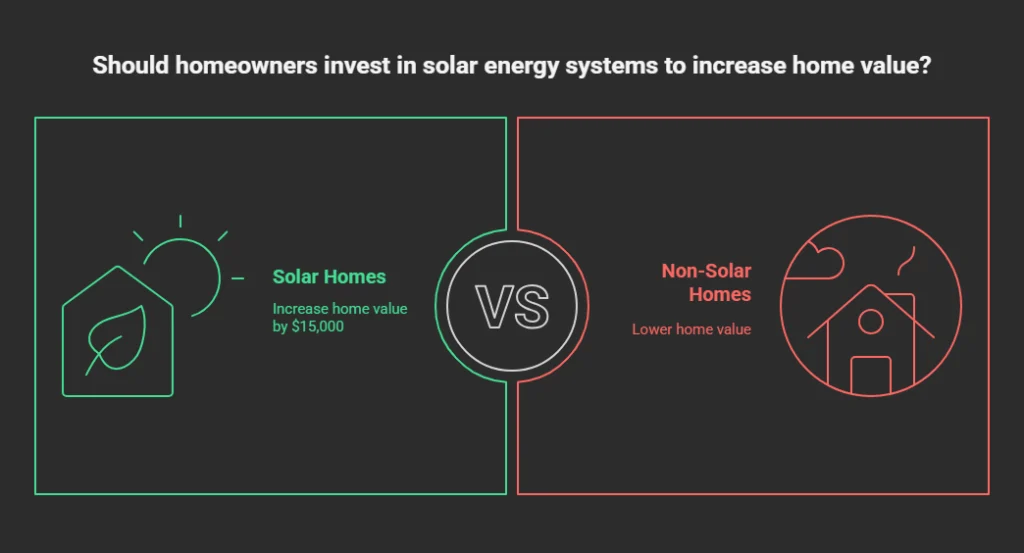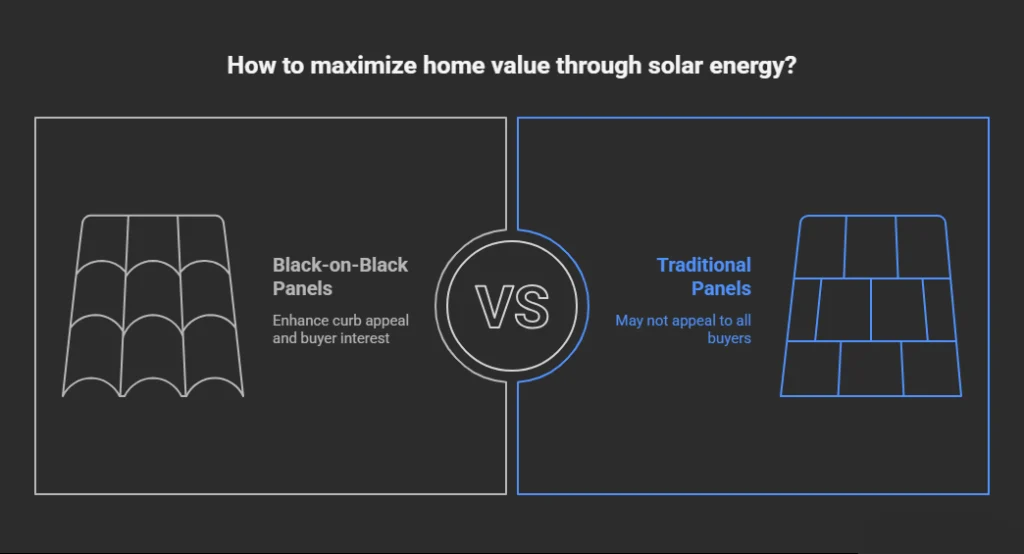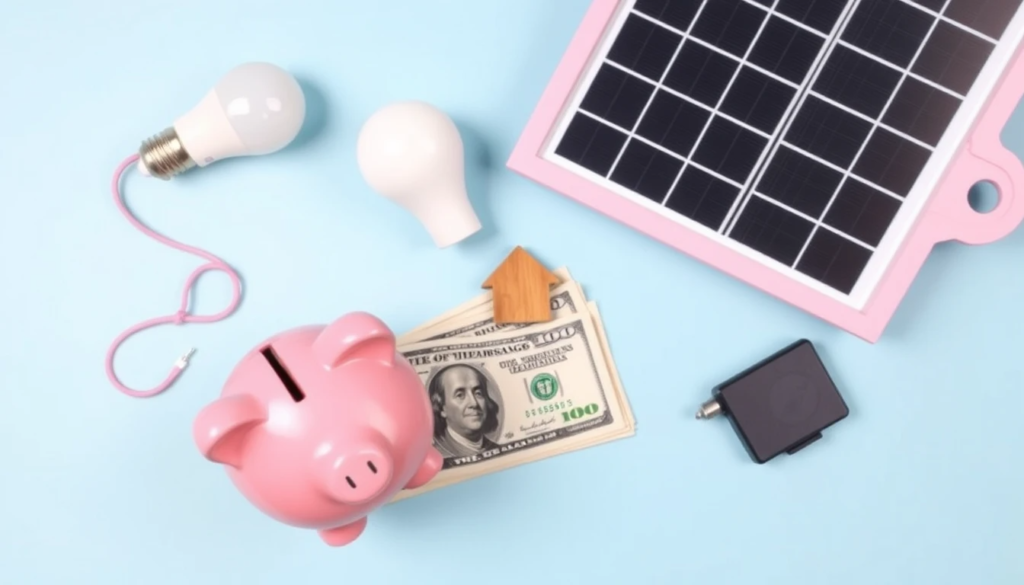“Do Solar Panels Increase Home Value? Experts Reveal The Truth”
In today’s environmentally conscious and economically volatile real estate market, homeowners are increasingly looking for sustainable upgrades that not only reduce their carbon footprint but also provide a solid return on investment. Solar energy systems have emerged as one of the most popular home improvements, but a critical question remains: Does solar actually increase home value?
As energy costs continue to rise and climate concerns mount, understanding the financial impact of solar installations has become essential knowledge for homeowners, real estate professionals, and investors alike. This comprehensive guide explores the relationship between solar panels and property values, backed by current research, expert insights, and real-world examples.
The Financial Impact of Solar Panels on Home Value
What Research Shows About Solar and Home Value
Multiple studies confirm that homes equipped with solar energy systems typically sell for more than comparable non-solar homes. According to a landmark study by the Lawrence Berkeley National Laboratory, homes with owner-owned solar photovoltaic systems sold for an average premium of $15,000 across various markets. This research, which analyzed nearly 22,000 home sales, remains one of the most comprehensive assessments of solar’s impact on home values.

More recently, Zillow research found that homes with solar panels sell for approximately 4.1% more than comparable homes without solar energy systems. For the median-valued home in the U.S., this translates to an additional $9,274 in value.
Sarah Johnson, a real estate appraiser with 15 years of experience in sustainable property valuation, explains: “I’ve consistently seen solar installations add between 3-5% to a home’s value in most markets. However, the premium can be significantly higher in areas with expensive electricity rates or strong environmental consciousness.”
Regional Variations in Solar Value Addition
The value added by solar panels varies considerably by location. Several factors influence these regional differences:
- Local electricity rates – Areas with higher electricity costs typically see greater value appreciation for solar homes
- Solar irradiance – Regions with more sunshine can generate more solar energy, increasing the system’s value
- Local incentives and policies – States and municipalities with favorable solar policies tend to have higher solar premiums
- Market awareness – Regions where buyers are more environmentally conscious often place higher value on solar features
| Region | Average Home Value Increase | Median Payback Period | Factors Influencing Premium |
| California | 4.1% – 6.4% | 5-7 years | High electricity rates, strong incentives, environmental awareness |
| Northeast | 3.5% – 5.8% | 6-8 years | High electricity costs, seasonal variation in production |
| Southwest | 4.5% – 7.0% | 4-6 years | Abundant sunshine, increasing cooling demands |
| Midwest | 2.7% – 4.2% | 7-10 years | Moderate electricity costs, less solar awareness |
| Southeast | 3.0% – 4.8% | 6-9 years | High cooling needs, improving incentive programs |
Based on compilation of data from Zillow Research, Berkeley Lab, and Solar Energy Industries Association reports
Owned vs. Leased Solar Systems
An important distinction that significantly impacts home value is whether the solar system is owned outright or leased:
- Owned systems typically add the most value to a home. When you own your solar panels, either through cash purchase or a loan that’s being paid off, the entire value of the system and its future energy production becomes part of the home’s assets.
- Leased systems have a more complicated impact on home value. While they still provide energy savings, the lease agreement must be transferred to the new homeowner, which can complicate the sales process. Some buyers may be hesitant to take on a lease agreement, potentially limiting the pool of interested purchasers.
According to research from the National Renewable Energy Laboratory, owned PV systems consistently add value to homes, while leased systems may not add significant value and can occasionally complicate the sales process.
Factors That Determine How Much Value Solar Adds
System Size and Quality
The size and quality of a solar installation play crucial roles in determining how much value it adds to a home:
- System size: Larger systems capable of offsetting more (or all) of a home’s electricity needs typically add more value than smaller systems.
- Panel efficiency: Higher efficiency panels from top-tier manufacturers tend to command better premiums.
- System age: Newer systems generally add more value than older ones, as they have more of their useful life remaining.
Michael Chen, a solar installer with SunPower Elite status, shares: “We’ve noticed that homes with premium panel brands like SunPower, REC, or Panasonic tend to command higher premiums. Buyers increasingly do their homework and recognize quality components that will last longer and perform better.”
Installation Quality and Aesthetics
The quality and visual appeal of the installation can significantly impact the value added:
- Professional installation by certified contractors with strong warranties typically adds more value
- Roof integration and sleek mounting systems can preserve or enhance curb appeal
- Panel placement optimized for both energy production and aesthetic considerations
“I recently sold a home in Boulder with a beautifully integrated solar array that actually became a selling point during showings,” recounts Emma Rodriguez, a real estate agent specializing in eco-friendly properties. “The black-on-black panels were arranged thoughtfully on the south-facing roof, and the system was producing enough energy to cover 90% of electricity usage. We received multiple offers above asking price, with several buyers specifically mentioning the solar system as a key factor in their interest.”

Market Understanding and Documentation
Proper documentation and education about the solar system’s benefits can maximize value addition:
- Performance history showing actual energy production and savings
- Warranty information for both the equipment and installation
- Maintenance records demonstrating proper care of the system
The ROI Timeline for Solar Installations
Short-Term and Long-Term Financial Benefits
Solar energy systems provide both immediate and long-term financial advantages:
Immediate Benefits:
- Reduced energy bills from the first month of installation
- Tax incentives and rebates that reduce upfront costs
- Protection against rising energy costs
Long-Term Benefits:
- Accumulated energy savings over the system’s 25+ year lifespan
- Home value appreciation when it comes time to sell
- Environmental benefits that increasingly translate to financial value
According to the Solar Energy Industries Association, the average American homeowner reaches the break-even point on their solar investment in 7-8 years. However, this timeframe varies widely based on local sunshine, electricity rates, and available incentives.
Tax Incentives and Rebates That Improve ROI
Various financial incentives can significantly improve the return on investment for solar installations:
- Federal Investment Tax Credit (ITC): Currently allows homeowners to deduct 30% of the cost of installing a solar energy system from their federal taxes through 2032
- State and local incentives: Many states offer additional tax credits, rebates, or performance-based incentives
- Solar Renewable Energy Credits (SRECs): In some states, homeowners can sell credits for the clean energy their system produces
“The federal tax credit remains one of the most significant financial incentives for homeowners considering solar,” explains James Wilson, CPA and renewable energy tax specialist. “When combined with state-level incentives and the ongoing energy savings, the financial case for solar has never been stronger for most homeowners.”
How Solar Impacts Different Property Types
Single-Family Homes vs. Multi-Family Properties
The impact of solar installations varies across different property types:
- Single-family homes typically see the most straightforward value addition, as the homeowner captures all the benefits of the system.
- Condominiums and townhomes may face HOA restrictions but can still benefit from individually owned or community solar systems.
- Multi-family properties present unique opportunities for landlords to increase property value while potentially commanding higher rents due to lower utility costs for tenants.
Commercial Properties and Solar Value
Commercial properties often see substantial benefits from solar installations:
- Higher capitalization rates due to reduced operating expenses
- Attraction of sustainability-minded tenants willing to pay premium lease rates
- Marketing advantages in increasingly eco-conscious markets
According to the U.S. Department of Energy, commercial buildings with solar installations can increase their property values through higher net operating income resulting from energy savings.
Navigating Solar Home Sales
Marketing Solar Features Effectively
When selling a solar-equipped home, proper marketing can maximize the value premium:
- Highlight energy production data and historical savings
- Educate potential buyers about the system’s features and benefits
- Emphasize the transferable warranties and remaining system lifespan
- Calculate the return on investment in clear, simple terms
“The key is translating technical solar attributes into benefits buyers can understand and value,” advises Sophia Martinez, a real estate broker who has sold dozens of solar-equipped homes. “Don’t just say ‘5kW system’—explain that it means nearly zero electric bills and protection against utility rate increases.”
Finding Appraisers and Agents Who Understand Solar
Working with real estate professionals who understand solar value is crucial:
- Seek appraisers trained in valuing solar installations through programs like the Appraisal Institute’s Valuation of Sustainable Buildings
- Choose real estate agents with experience selling high-performance and solar homes
- Provide documentation that helps professionals accurately value the system
The Appraisal Institute offers resources for finding appraisers trained in valuing high-performance features like solar energy systems.
Solar Considerations for Specific Audiences
Homeowners and Residential Property Owners
If you’re a homeowner considering solar:
- Evaluate your long-term plans: The longer you plan to stay in your home, the more financial benefits you’ll personally realize from your solar investment.
- Consider your local housing market: Research comparable solar homes in your area to understand the potential value addition.
- Obtain multiple quotes: System quality and design can significantly impact both energy production and value addition.
Small Business Owners and Commercial Property Managers
For commercial property owners:
- Analyze tenant preferences: Properties with lower operating costs and sustainable features often attract quality tenants willing to sign longer leases.
- Consider accelerated depreciation benefits: Commercial solar installations may qualify for MACRS depreciation, improving financial returns.
- Explore C-PACE financing: Commercial Property Assessed Clean Energy programs can provide attractive financing options in many jurisdictions.
Renewable Energy Contractors and Installers
For solar professionals:
- Educate clients about value addition: Help potential customers understand how solar can impact their property values.
- Partner with real estate professionals: Build relationships with appraisers and agents who understand solar value.
- Document system performance: Provide clear monitoring data and performance guarantees that can be shared with future buyers.
Tax Professionals, CPAs, and Financial Advisors
For financial professionals advising clients:
- Stay current on incentives: Solar incentives change frequently at federal, state, and local levels.
- Consider whole-picture ROI: Help clients understand both the immediate tax benefits and long-term value appreciation.
- Analyze financing options: The choice between cash purchase, solar loans, and leases can significantly impact the financial outcome and property valuation.
The Future of Solar and Home Values
Emerging Trends in Solar Technology and Valuation
Several trends are likely to impact the relationship between solar and home values in coming years:
- Integrated solar products like Tesla’s Solar Roof and solar shingles are improving aesthetics and may command higher premiums
- Battery storage integration is becoming more common, potentially adding additional value
- Smart energy management systems that optimize solar usage are increasingly sought after
According to EnergySage market data, homes with solar-plus-storage systems are gaining popularity among buyers concerned about energy independence and resilience.
Policy Changes and Market Evolution
The solar valuation landscape continues to evolve:
- Growing standardization in how solar is valued in real estate transactions
- Increased lender awareness of solar’s impact on affordability through reduced operating costs
- Potential future carbon pricing that could further enhance the value of zero-emission homes
Conclusion: Is Solar a Good Investment for Home Value?
The evidence overwhelmingly suggests that owned solar energy systems do increase home values in most markets. However, the extent of this value addition varies based on system quality, local factors, and how the system is financed.
For homeowners planning to stay in their homes for at least 5-7 years, solar installations typically provide a positive return on investment through a combination of energy savings, incentives, and property value appreciation. Even those planning to sell sooner may recoup much of their investment through increased home value, particularly in markets with high electricity costs and strong environmental consciousness.
As the housing market increasingly values sustainability and energy efficiency, solar installations are likely to become an even more significant factor in home valuation. By understanding the factors that maximize solar’s contribution to property values, homeowners and investors can make informed decisions that benefit both their finances and the environment.
Are you considering adding solar to your property? Consult with qualified solar installers, real estate professionals, and financial advisors familiar with your local market to determine the potential impact on your specific property’s value.


